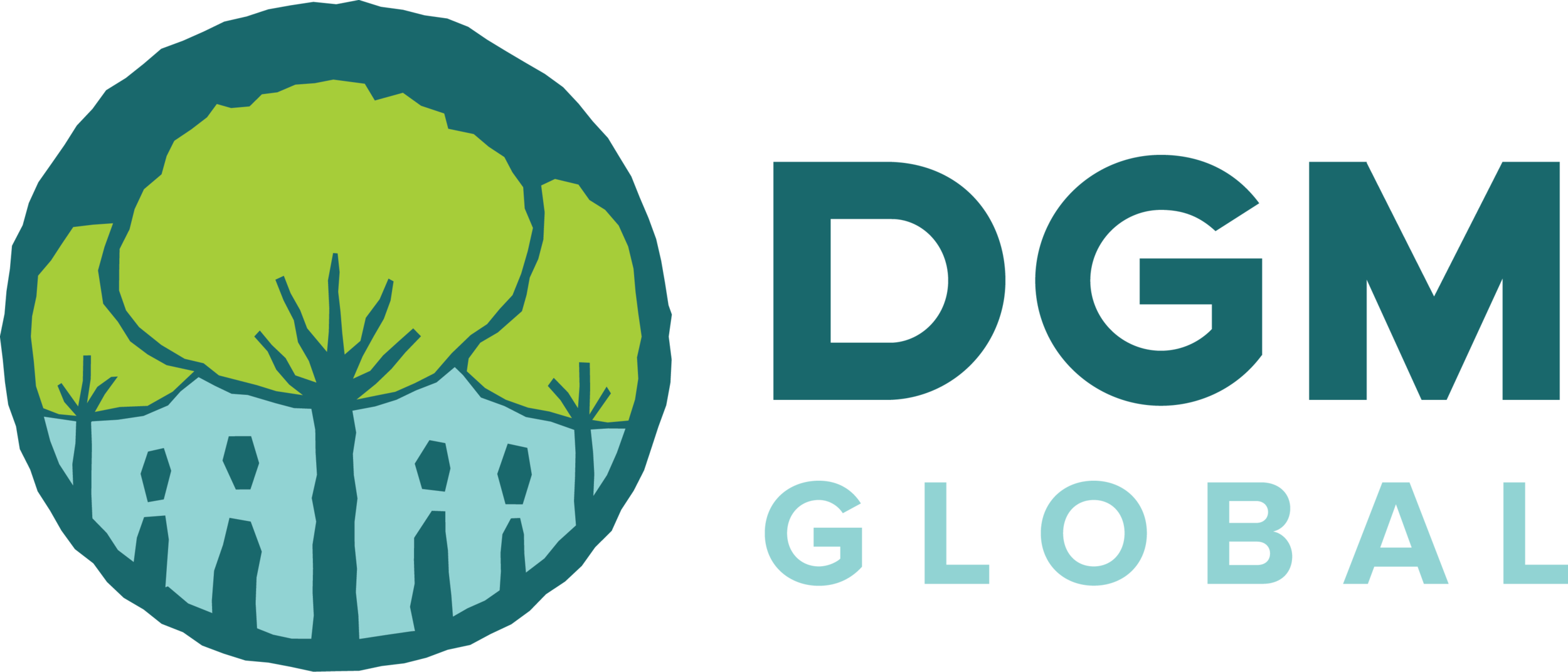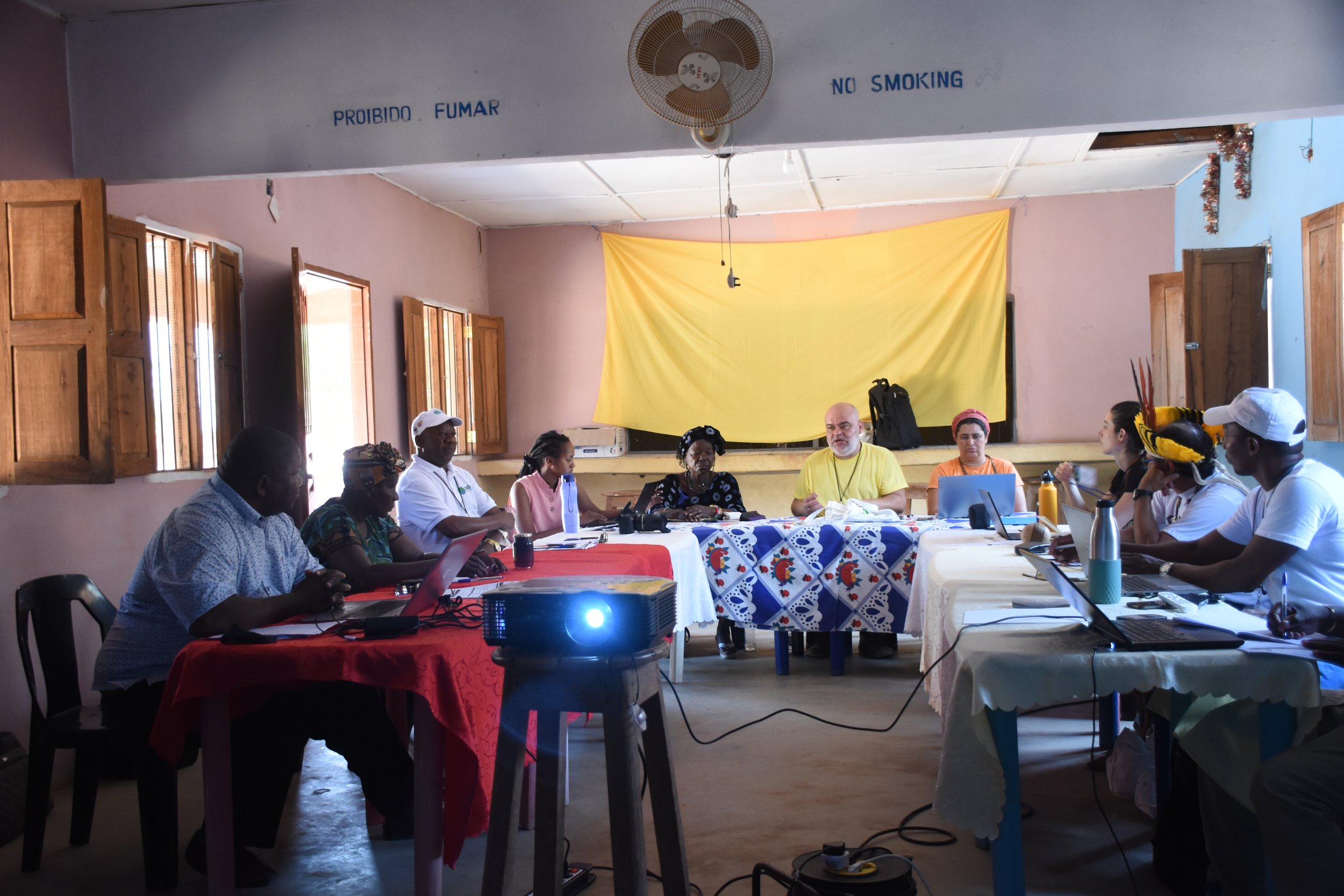DGM: Connecting Traditional Peoples from Brazil and Mozambique
DGM Global cannot guarantee the accuracy of Google translations. In case of discrepancies, the original language takes precedence.
Contributed by: Camila Santana, Communications Consultant and Pollyana Mendonça, Consultant (World Bank Brazil)
Welcome chants and Malango dance moves marked the beginning of the bilateral exchange of the Dedicated Grant Mechanism for Indigenous Peoples and Local Communities (DGM) between Brazil and Mozambique. A Brazilian delegation composed of four representatives from the DGM Brazil Steering Committee landed in Quelimane, the capital of Zambézia on October 10, 2022, to share knowledge, ideas, and best practices in the fields of traditional medicine and cooperatives. Over the course of five days, traditional medicine specialist Lucely Pio, family farmer Giba Tuxá, cooperative member Mayk Arruda and World Bank consultant Pollyana Mendonça shared the Brazilian experience with projects conducted in the Cerrado region.
In addition to similar types of forests (Miombo in Mozambique and Cerrado in Brazil), the two countries - both former colonies of Portugal - also share historical and cultural ties. Both countries also have projects under the DGM, which is part of the Forest Investment Program of the Climate Investment Funds.
The October 2022 trip to Mozambique served as a reunion. The DGM Mozambique delegation had visited Brazil in 2016 to learn about actions to combat deforestation in the Cerrado biome. The group was interested to learn more about the actions conducted by DGM Brazil at the time, which involved an environmental protection system coupled with support to communities that relied on the land for their subsistence.
Six years later, DGM Brazil returns the visit at the time of a strategic milestone. The project has just had its second phase approved by the World Bank. This time, USD 930,000 will be invested in sustainable livelihoods to ensure the conservation of natural resources while generating income and increasing the food security and well-being of traditional communities and indigenous peoples in the Cerrado biome.
The first phase ended in January 2022, and the representatives of the DGM Brazil Steering Committee brought home a wealth of experience and accumulated results. Sixty-four sub-projects throughout the Cerrado region received a total of USD 6.5 million in investment. The project benefited 34,780 people in total, including 19,372 indigenous people and 11,056 women, in addition to youths and the elderly. DGM Brazil also provided emergency assistance during the COVID-19 pandemic, to the benefit of 6,250 people in communities served by the project.
DGM Mozambique
Both in Brazil - where DGM's track record has had a significant impact on the Cerrado - and in the Miombo biome in Mozambique, the projects have proven to be an important instrument in empowering traditional communities. During our visit, Daniel Maula, chair of the DGM Mozambique Steering Committee and coordinator of NGO Radeza, said that it was the first time conservation projects had been written and proposed by the communities themselves. All initiatives prior to this experience had been ready-made solutions brought in from outside. The request for proposals was broadcast on local radio stations and regional meetings were held. DGM Mozambique received a total of 107 proposals, of which 18 were approved.
The full amount for DGM Mozambique is USD 4.5 million. It is expected to benefit 2,000 people directly and train at least 5,000 people to engage in integrated landscape management. The sub-projects focus on the creation of value chains, such as the development of small poultry farms, horticulture, honey production, forest management for the sale of wood and coconut trees, and community-based tourism.
Exploring Miombo
This context served as a kick-off for the activities of the Brazil-Mozambique bilateral exchange. After disembarking in Quelimane, the group took a four-hour drive to Maganja da Costa. The local community that benefits from the DGM lies on the shores of the Ruguria Lake. Tourism will be promoted here with the construction of chalets and a kitchen. The Brazilian delegation attended a round table discussion and shared the experiences of community-based tourism initiatives under the DGM in the Cerrado biome. One such initiative is in the Mumbuca community, in the Jalapão region of the state of Tocantins, which seeks to value traditional knowledge in a region inhabited mostly by quilombola communities.
The delegation left Maganja da Costa and headed to Muzo to visit a native wood processing facility run by the ACODEMUZO Association. The community will receive support from the project to develop a management plan for two timber species, encompassing both a cutting plan and a replanting plan. Everyone in the region lives off the forest, from which they get honey, mushrooms, fruit, game, medicine, and firewood. During this exchange of experiences, Mayk Arruda recalled the importance of a business plan in making sure that a product's final price covers all production expenses. The Brazilian delegation also provided testimonials about experiences in non-timber management for income generation, such as bush medicines and other food products that could benefit as well.
The trip continued to Mocubela and coincided with the celebration of national Teachers' Day. The agenda included experiences about cooperatives in Brazil presented by Mayk, who also gifted products from Central do Cerrado - such as baru nuts and babaçu flour - to the Mozambique delegation; work related to family farming in the Tuxá village, presented by Giba with photos of vegetable gardens, plantations and sheep and fish farming; and reports and data on the scope of DGM Brazil, especially on the gender issue, presented by Lucely. Pollyana Mendonça also shared the results of a broad assessment conducted with local coordinators of Brazilian sub-projects.
In Mulate, the group learned about the work of APROCAMO Cooperative. Their main source of income is the burning of charcoal, which involves cutting down trees in the forest. The DGM's objective here is to support the implementation of a poultry farm as another means of income generation for the population. A shed was built with the necessary infrastructure to raise chickens, which, at the time of the visit, were ready for sale. The cooperative members are hopeful about the farm's success and excited about the prospect of working less with charcoal.
Inspiration
The DGM Mozambique Training Center in Zambézia was inspired by the DGM Training Center in Brazil, which the delegation got to know in their visit to Brazil six years ago. A workshop on Community Enterprise Management was held in that location by Mayk Arruda, with support from Giba Tuxá. Representatives from associations that benefit from the sub-projects visited by the delegation learned more about Brazil's experience with cooperatives. The participants had a transparent conversation about key challenges and the good practices needed to achieve success in their endeavors.
A workshop on Traditional Medicine was also held by Lucely Pio, with support from consultant Pollyana. Ten Mozambican healers, five women and five men, carried in their luggage some of the roots and herbs they use in their craft. Some healers had learned their craft from their mothers, fathers, grandmothers, and grandfathers. Others had been taught directly by the spirits, usually after having been sick for some time. They talked about making teas, poultices and baths and presented roots, leaves, and potatoes that cure a broad spectrum of conditions, ranging from pain, infections, infertility, asthma, worms, thrombosis, anemia, snake bites and a myriad of other health problems.
Lucely showed medicinal plants from the Cerrado biome, floral bottles, room scents, soaps, moisturizers, repellents, and crystals. The healers recognized plants that grow on both continents. The quilombola instructor talked about how the healers of the Cerrado worry about the sustainability of the plants and places where they grow, as well as the best ways to extract much needed medicines without jeopardizing the trees.
Sustainability and Communication
The Mozambique Steering Committee is concerned about the continuity of sub-project activities after DGM investments come to an end. Lack of widespread formal education, high illiteracy rates and the fact that much of the population does not speak Portuguese raise concerns about the sustainability of the actions currently in place. Many people in the region are not aware of the projects underway, because most of the communication happens on social networks and not everyone has access to the Internet.
In addition to funding, DGM Mozambique understands that sustainability is also about the production and communication of knowledge. We underscored the importance of recording and disseminating the information and knowledge acquired, by means of materials available in community libraries, books, videos and podcasts. We also highlighted the role of communication as an educational process, and the need to use channels accessible to the beneficiaries - such as local radios and community theaters - to inform the population and add value to the process.
Saying "see you soon!"
With the trip coming to an end, participants report feelings of satisfaction and gratitude for meeting other cultures and sharing information as part of this exchange. We return to Brazil inspired by the warm welcome and generosity shown by the Mozambican people during interviews and testimonials. It seems that the bond between Brazil and Mozambique Steering Committees has been strengthened, with glimpses of an alliance to ensure the continuity of the DGM project in general and a bi-national relationship that can expand well into the future.
In all communities and associations we visited, the exchange of experiences was open, fertile, and instigating, and left a feeling of closer ties between the two countries, especially in terms of how much the experiences of community projects in Brazil can contribute to the development of sub-projects currently underway in Mozambique.






